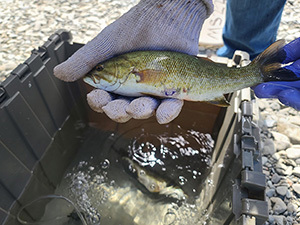
Report Date:
http://www.dfw.state.or.us
CHARLESTON, Ore – ODFW biologists are radio-tagging smallmouth bass in the Coquille River to learn more about these invasive non-native fish negatively impacting fall chinook salmon.
Captured smallmouth bass eight inches or larger get a surgically implanted radio tag that can be tracked for up to 18 months depending on battery life. Biologists then use radio telemetry equipment to track movements of the tagged fish.
Tagging efforts are concentrated in the South Fork Coquille River where much of the smallmouth bass population occurs. Some bass may be tagged in other portions of the Coquille Basin.
It is important to know when and where these fish move to overwintering areas in the Coquille, and when they move back upriver in the spring. Timing information may help biologists remove more smallmouth bass during electroshocking, or experiment with alternative removal methods such as trapping.
"We're looking for opportunities to get as many of these non-native fish out of the Coquille system as possible," says Gary Vonderohe, Assistant District Fisheries Biologist.
Anglers are reminded it is illegal to keep a radio-tagged fish. Radio-tagged bass will have an antenna protruding from the side of the fish. The goal is to radio tag about 20 smallmouth bass.
Report Date:
SALEM, Ore.—The Oregon Department of Agriculture (ODA) and the Oregon Department of Fish and Wildlife (ODFW) announce the closure of......